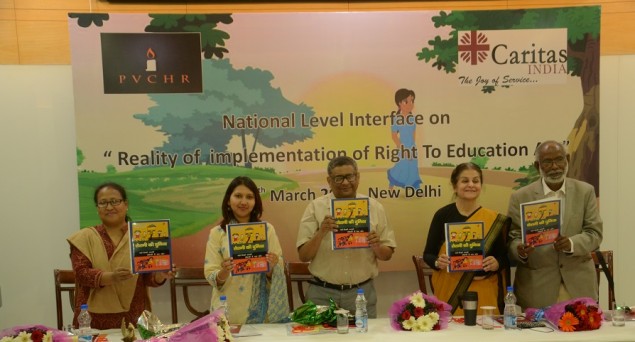Waquar Hasan, IndiaTomorrow.net,
New Delhi, March 29: Eminent activists, academicians and intellectuals have expressed grave concern over the ground situation of implementation of the Right to Education act. They were speaking at a program for assessment of grass root implementation of the free education law in the last five years. A research report on the ground situation of RTE implementation in four districts of Bihar was also released on the occasion.
Lenin Raghuvanshi, Secretary General of Peoples’ Vigilance Committee on Human Rights shared the finding of the research report which was conducted in four districts Purnea, Munger, Madhubani and Patna of Bihar. In his opening speech, he said the report and its recommendations will be compiled and communicated to NGOs, political parties, Niti Aayog, members of Parliament and Ministry of Human Resource Development.
Speaking as Chief Guest, Dr. Syeda Saiyidain Hameed, former Member of Planning Commission of India said: The few points mentioned in the reports show the alarming condition of the RTE implementation at the grass root level. Especially on the ratio of student and teachers, while this ratio should be 35:1 but the actual ratio is 66:1. She also stated that there is no appointment of cleaner in the school resulting in children spending more time in cleaning the school.
Highlighting low budgetary allocation on education, she said: “In 1960, when my father was Secretary for education, Kothari report had recommended that six percent of GDP should be devoted to education. Currently it is not even 4 percent”.
She stressed on huge spending on public education system.
“On one side there are high-end type schools that are wall to wall air-conditioned, on the other side, there are thousands of small schools that have English and fancy names like Little Angels etc. I don’t know what they teach and what fees they charge but those schools are only for middle income groups. Our entire force (public spending) should be invested on public education because children are our capital and future.”
Participating in a panel discussion later, eminent members of civil society including Dr. John Dayal, Secretary General, All India Christian Council, Ms. Jayshree Bajoria, Researcher, Human Rights Watch, Mr. Shantanu Datta, Director Engagement, International Justice Mission, Shimray, Assistant Zonal manager, Caritas India and Ms. Jagmati, All India General Secretary, AIDWA talked about different aspects of RTE and education system in the country.
Describing the ground situation of dropout students, Ms. Jayshree Bajoria said “In 2013 (after 3 years of RTE in force), we started research on it (RTE). We saw that the data of the government showed that most of the children were present in school. But only three of every five students who are admitted into the schools reached to 8th class. Despite RTE being compulsory, 40 of every 100 children would not reach to 8th class. If we look closely at the figures of drop-out, we see that most of them are marginalized children. They are from dalit, Muslims and Adivasi communities”.
Shimray, Assistant Zonal manager, Caritas India said: “These marginalized communities have been pushed to peripheries of the society for various human greed by those who haves. And the gaps between haves and haves not have much widened and we realized this. And we felt the need of working on education because we believe that only education can move communities from darkness to lights”.
The program was jointly organized by Caritas, an NGO, and Peoples’ Vigilance Committee on Human Rights on 29 March at Constitution Club in New Delhi.





